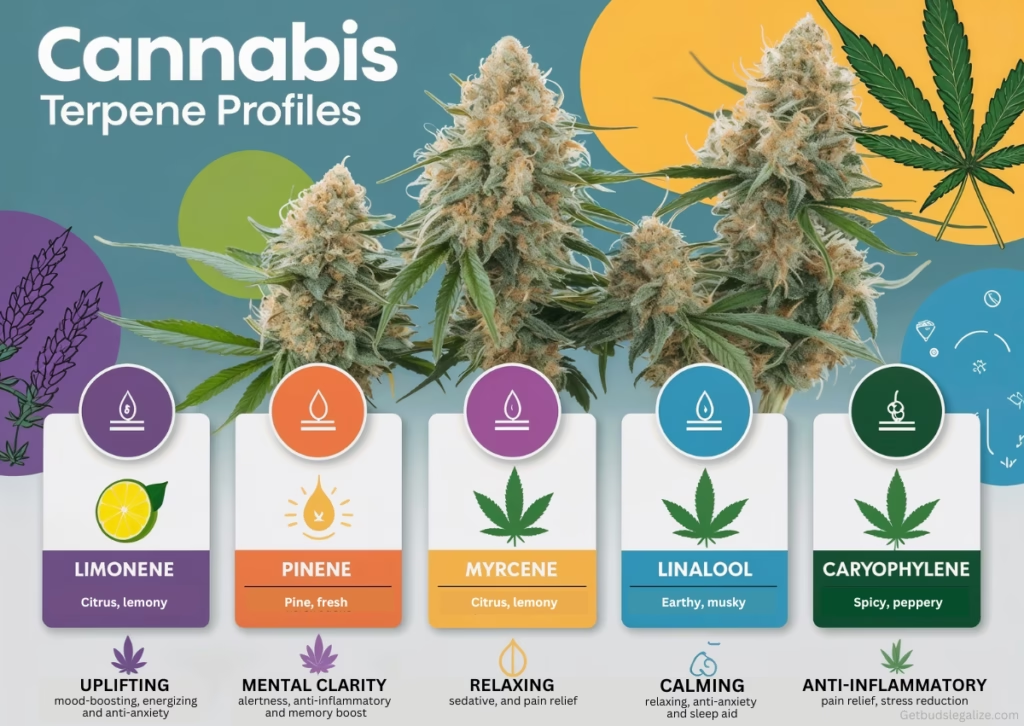What are Cannabis Terpenes and What Do They Do?
If you’re a cannabis enthusiast, you may have noticed that different cannabis strains have different aromas and flavors. Some may smell citrus, pine, or cheese, while others may taste like berries, mint, or diesel. These variations are largely due to the presence of terpenes, which are aromatic compounds that give cannabis and many other plants their distinctive scents and flavors.
But terpenes aren’t just exclusive to cannabis flowers; They can also be found in many other plants, such as herbs, fruits, flowers, and spices. Terpenes play an important role in plant survival, as they can attract pollinators, repel predators and protect against environmental stressors.
What are the Therapeutic Benefits of Terpenes?
Terpenes can boast a wide range of medicinal properties, depending on their chemical structure and mode of action. Some of the most common and well-studied benefits of using terpenes are:
• Anti-inflammatory properties:
Terpenes can modulate the immune system and reduce inflammation by inhibiting the production of cytokines and pro-inflammatory enzymes. Some terpenes, such as myrcene, pinene, limonene, and linalool, have shown anti-inflammatory effects in animal and human studies. They can also help with pain relief by blocking pain signals or enhancing the action of endogenous opioids.
• Antioxidant properties:
Terpenes can protect cells from oxidative stress and damage by eliminating free radicals and enhancing the activity of antioxidant enzymes. Some terpenes, such as carvacrol, thymol, geraniol, and citronellol, have demonstrated antioxidant properties in vitro and in vivo. They can also prevent or delay the onset of chronic diseases associated with oxidative stress, such as cardiovascular disease, diabetes, neurodegenerative disorders, and cancer.
• Antimicrobial properties:
Terpenes can inhibit the growth or kill various microorganisms, such as bacteria, fungi, viruses, and parasites. Some terpenes, such as eugenol, terpineol, carveol, and limonene, have shown antibacterial, antifungal, antiviral, and antiparasitic activities in vitro and in vivo. They may also enhance the efficacy of conventional antibiotics or antivirals by synergizing with them or reducing their resistance.
• Anticancer properties:
Terpenes can induce apoptosis (programmed cell death) or autophagy (self-digestion) of cancer cells by modulating various signaling pathways and genes involved in cell proliferation, differentiation, survival, invasion, angiogenesis, and metastasis. Some terpenes, such as beta-caryophyllene, nerolidol, perillyl alcohol, and phytol, have shown anticancer effects in vitro and in vivo against various types of cancer cells. They may also enhance the efficacy of conventional chemotherapy or radiotherapy by sensitizing cancer cells to them or protecting normal cells from their toxicity.
• Neuroprotective properties:
Terpenes can protect the neurons from degeneration or damage by modulating the neurotransmitter systems, such as dopamine, serotonin, glutamate, acetylcholine, and endocannabinoid systems. Some terpenes, such as pinene, limonene, linalool, and alpha-bisabolol, have shown neuroprotective effects in vitro and in vivo against various neurotoxic agents or models of neurodegenerative disorders. They may also improve cognitive function, memory, learning, mood, anxiety, depression, sleep quality, and seizure control by influencing brain activity or plasticity.
Are There Any Side Effects to Using Terpenes?

Terpenes are generally considered safe and non-toxic, but they may have some side effects in some people. These side effects may depend on the dose, the method of consumption, the individual’s sensitivity, and the presence of other substances. Some possible side effects of terpenes are:
- Allergic reactions: Some people may be allergic to certain terpenes or their sources, such as pine, lavender, or citrus. Allergic reactions may include skin rashes, itching, swelling, sneezing, coughing, wheezing, or anaphylaxis. People who have a history of allergies or asthma should be careful when using products that contain terpenes.
- Drug interactions: Some terpenes may interact with certain medications or supplements, either by enhancing or inhibiting their effects. For example, limonene, a terpene found in citrus fruits and cannabis, may increase the absorption of some drugs by the body. This may lead to higher blood levels and an increased risk of side effects. On the other hand, myrcene, a terpene found in mangoes and cannabis, may enhance the sedative effects of some drugs, such as opioids or benzodiazepines. This may lead to excessive drowsiness and impaired motor skills. People who take any medications or supplements should consult their doctor before using products that contain terpenes.
- Mood changes: Some terpenes may have psychoactive effects on the brain, either by stimulating or relaxing the nervous system. For example, pinene, a terpene found in pine trees and cannabis, may improve memory and alertness. On the other hand, linalool, a terpene found in lavender and cannabis, may induce calmness and relaxation. These effects may be beneficial for some people, but they may also cause unwanted mood changes in others. People who have a history of mental health issues or mood disorders should be cautious when using products that contain terpenes.
How Do Terpenes Affect High?
Terpenes aren’t just responsible for the smell and taste of cannabis; They also have an influence on the effects of the plant. They can modulate the activity of cannabinoids, such as THC and CBD, enhancing or decreasing their potency, altering their onset and duration, and creating different moods and health benefits for the human body.
Here are some examples of how cannabis terpenes can affect high:
The effects of terpenes can vary depending on the genetics, metabolism, tolerance, and method of consumption of the individual. Here’s a list of the most prevalent terpenes in cannabis plants and how their effects can affect your high:
• Myrcene:
This is one of the most common cannabis terpenes, especially in Indica strains but also mango, lemongrass, and thyme. The myrcene has a musky and earthy aroma and is known to have sedative and relaxing effects, as it can enhance the binding of THC to CB1 receptors in the brain. It can also increase the permeability of the blood-brain barrier, allowing more cannabinoids to enter the brain. Therefore, myrcene can make cannabis more potent and induce a couch-lock effect.
• Limonene:
This is another terpene common in cannabis, especially in Sativa strains, but it’s also found in lemons, oranges, and peppermint. The Limonene has a citrusy aroma and is fresh and is known to have uplifting and energizing effects, as it can increase the levels of serotonin and dopamine in the brain. It can also improve the absorption of other terpenes and cannabinoids through the skin and mucous membranes. Therefore, limonene can make cannabis more euphoric and stimulating.
Pinene:
This is one of the most widely distributed terpenes in nature, as it is found in pines, rosemary, basil, and sage. It has a pine and woody aroma and exists in two forms: alpha-pinene and beta-pinene. Pinene is known to have anti-inflammatory and bronchodilator effects, as it can inhibit the enzyme that breaks down acetylcholine in the lungs. It can also counteract the memory deterioration caused by THC, as it can inhibit the enzyme that breaks down acetylcholine in the brain. Therefore, pinene can make the effects of cannabis more polished and concentrated.
• Linalool:
This is a common terpene in cannabis, especially hybrid varieties, but it is also found in lavender, mint, and coriander. Linalool has a floral and sweet aroma and is known to have calming and soothing effects, as it can modulate the activity of GABA receptors in the brain. It can also strengthen the immune system and reduce inflammation. Therefore, linalool can make marijuana more relaxing and therapeutic.
• Caryophyllene:
This is a unique terpene in cannabis, as it is the only one that can bind directly to CB2 receptors in the body, and can also be found in black pepper, cloves, and cinnamon. Caryophyllene has a spicy and peppery aroma and is known to have anti-inflammatory and analgesic effects, as it can activate the endocannabinoid system without causing psychoactive effects. It can also modulate the effects of THC on CB1 receptors in the brain. Therefore, caryophyllene can make cannabis more balanced and medicinal.
Here Are Some Tips to Keep in Mind to Start Exploring Terpenes:

1. Choose high-quality products:
Not all cannabis products are created equal, and some may have lower terpene levels or contain artificial additives that can affect flavor and potency. Look for products that are lab-tested, organic, and transparent about their ingredients and sources. You can also check the product labels or websites for information on the terpene profile, which shows the types and amounts of terpenes present in the product.
2. Experiment with different strains and methods of consumption:
Different cannabis strains have different terpene profiles, and each one can offer a unique experience. For example, strains that are high in myrcene, a terpene that has a musky and earthy aroma, tend to be more relaxing and sedating. Strains that are high in limonene, a terpene that has a citrusy and fresh aroma, tend to be more uplifting and energizing. You can also try different methods of consumption, such as smoking, vaping, edibles, oils, or tinctures, to see how they affect the terpene delivery and effects.
3. Pay attention to your senses and preferences:
Terpenes are not only about the effects but also about the enjoyment. The best way to find out what terpenes work for you is to trust your senses and preferences. Smell and taste the product before you consume it, and notice how it makes you feel during and after. You may find that some terpenes appeal to you more than others, or that some combinations work better for certain situations or purposes. You can also use online tools or apps to help you track your terpene intake and experiences.
Where to Buy the Best Cannabis Terpenes Online
If you’re looking for the best cannabis terpenes for sale, you have plenty of options to choose from. You can buy terpenes online from reputable brands such as The Terpene Store, Leafly, or True Terpenes. These websites offer high-quality, natural, strain-specific terpenes that you can use to personalize your cannabis experience.
Some of the main cannabis strains and their main terpenes are Blue Dream (myrcene), Sour Diesel (myrcene and limonene), and Dutch Treat (terpinolene). Whether you want to add some sweetness, sourness, or pine to your cannabis, you can find the perfect terpenes for your needs online.
Final Thought
In conclusion, terpenes are important components of the cannabis plant that contribute to its sensory and pharmacological qualities. By learning more about terpenes and how they interact with cannabinoids and each other, you can better understand how they affect you and choose the marijuana strains that best suit your preferences and needs.

















